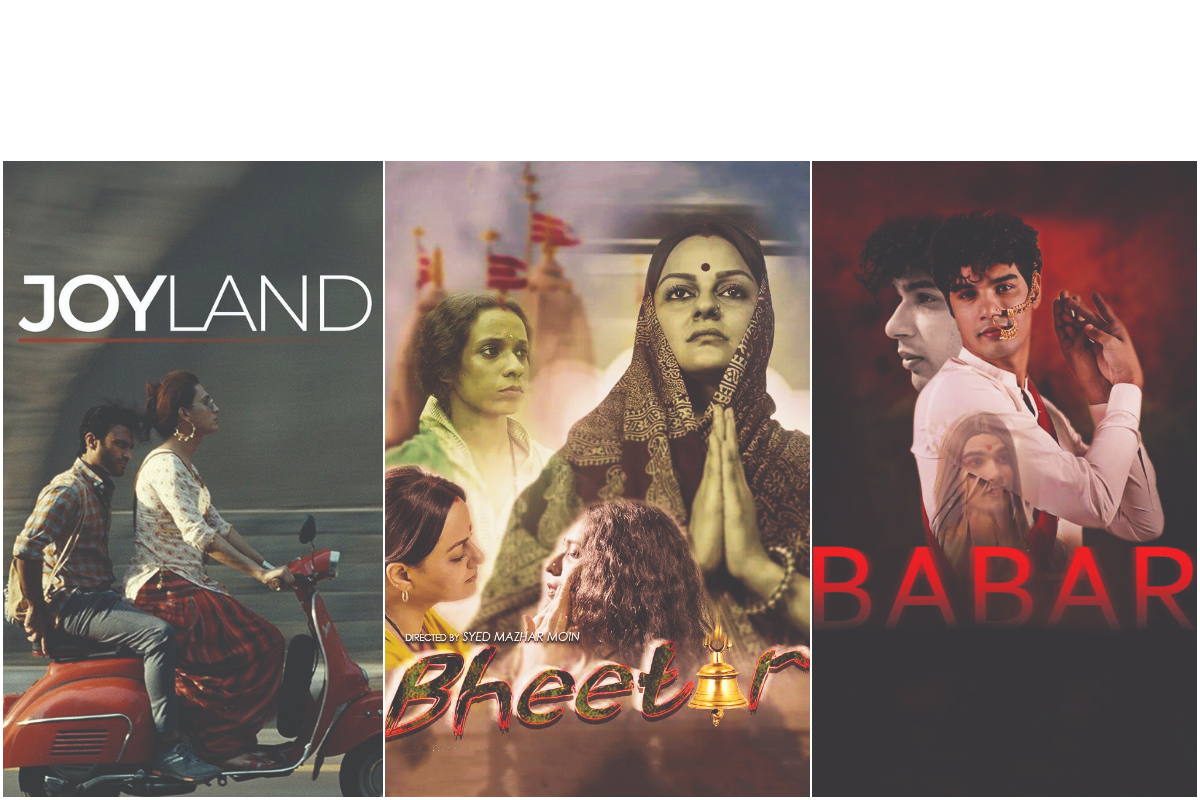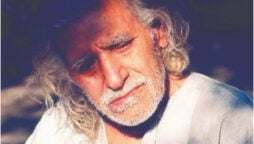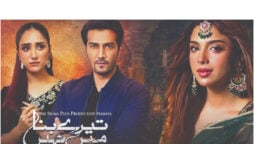
Forbidden world
The forthcoming short film ‘Bheetar – A Love Story’ has become the talk of the town, but for all the wrong reasons
Karachi: Though the entertainment industry in Pakistan has never been free from scandals and controversies, it seems the people pulling the strings of the industry have mastered the knack of achieving global fame and winning international accolades at the expense of infuriating the local audience by showing them something, which is nothing but controversial by all measures.
Following in the footsteps of Saim Sadiq’s Joyland, the forthcoming short film ‘Bheetar – A Love Story,’ written and directed by Mazhar Moin, has even gone further than Joyland and has become the talk of the town all of a sudden. BOLD delves deeper to find out the reasons of such trending topics these days.
The cast of the film ‘Bheetar – A Love Story’ includes Zohaib Bux, Usman Chaudhry, Manal Siddiqui and Javeria Abbasi as lead actors. Presented by a YouTube channel Meem Kahani, the OTT channel believes in depicting the hard-hitting reality as well as entertaining mature audiences by showing them fascinating characters to make them love, laugh and feel through bold, taboo and controversial stories, as the official statement goes.
If the aforementioned is the mission statement of the channel, the mission has successfully been accomplished, as it is rightly implied by the short film’s teaser which went viral as soon as it was released. Given that the film’s teaser is not enough to approve or disapprove the film altogether, however, since a single drop makes the ocean, the short film Bheetar is reportedly based on the issue, which is neither ubiquitous nor relatively significant or appropriate for the audience by and large.
The teaser of the film has set the internet on fire. And this is mainly because the film reportedly revolves around the same-sex marriage between two women, as though it is the only hard-hitting reality left in the world to portray on screen for mature audience in a language spoken and understood by those who would never approve such unpalatable themes, and that too on a medium that is more accessed round the clock by immature audience than mature ones.

Masquerading in the guise of entertainment, Bheetar is much more than a piece of entertainment aimed for public view as it openly defies the centuries-old social norms, along with long-cherished matrimonial traditions backed by the most-revered religious teachings in world history. Over and above a brazen rebellion against the fervent beliefs, it indicates a great deal about the principal motif behind yet another polemical flick adding to the tally of provocative pictures, which are intentionally produced to secure overnight fame internationally at the cost of maligning the country as well as pillorying its majority of people, along with their socio-cultural values, customs and religious doctrines.
As things currently stand in Pakistan’s entertainment industry, there has been quite a trend of coming up with an out-of-the-box storyline, which is tainted with a controversial theme and shows a reckless disregard for the sensitivity of viewers. Falling into the same category, it seems the short film is a litmus test which has initially been carried out to measure the mass reaction in a country like Pakistan against a contentious as well as divisive subject that palpably crosses the moral red line, brashly defies the sociocultural milieu by any stretch of imagination and revels in surpassing the legal boundaries of the country which criminalises such aberrant relationships between the same gender with harsh punishments.
The same thing was tried on the television screen some years before when a long play titled ‘Chewing Gum’ was aired on a private TV channel. Though ‘Chewing Gum’ was more allusive than out-and-out as per its content, the play did cause a fracas in the audience, owing to its highly disputed theme from the word go. Though the making of such shows in a country like Pakistan can simply be referred to as an audiovisual crime, the overriding intent behind such egregious efforts is as bright as day. More than an agenda-driven rhetoric based on the Universal Declaration of Human Rights with reference to 70:30 Articles in particular, featuring issues related to LGBTQ on TV, film or computer screen can never be ruled out as a one man’s hankering for a big idea out of a naïve urge for sudden sensation. In stark contrast, such programmes are always an outcome of predefined, well-orchestrated and calculated efforts made under the veil of individual’s penchant and are primarily aimed at increasing the social acceptability of immoral human behaviour in a society that values moral conformity, as defined by the state.
As a state within the state leads to political anarchy and civil unrest, the people of the state cannot operate in silos by apparently contravening the state directions to accommodate their self-interests. Especially when it comes to the freedom of expression and liberty of thought, boasting ‘my way or the highway’ attitude does not work in mass media, as one’s unbridled liberty must reach its limit where the other’s nose begins.
Considering the fact that Pakistan, similar to many other Islamic nations, is under duress to become the signatory to the UN declaration that calls for the decriminalisation and de-penalisation of consensual same-sex relations between adults, efforts are in place on a global scale to make LGBTQ a household term, particularly in a society known for its absolute disapproval for homosexual practices. India is the relevant and the most current example where various narrative tools, including films, were heavily employed to include LGBTQ issues in mainstream media discourse in order to bring such dark matters into the public agenda. Now the decriminalisation of Section 377 in September 2018 in the Hindu-majority land is not a coincidence from any perspective, in spite of the fact that none of the mainstream religions in India allow homosexuality in its any conceivable form.

In the given scenario, the short film ‘Bheetar – A Love Story’ seems to have played it quite safe by projecting the story in a Hindu background, but the film’s teaser does not make it clear whether the characters are based in India or Pakistan. However, it proves the fact that the disciples of Manto, who was an intellectual errant by himself, cannot think beyond women’s sexuality and revel in its convoluted intricacies with gusto, be it producing a piece of literature or making of a film or TV show or any kind of audiovisual documentary aimed at raising public awareness or, better to say, ripping the social fabric apart in the name of filmmaking.
In a word, an act of sexual deviancy or moral aberration should not be fantasised and glamourised in mainstream media to give leeway for the rest of the films of the same ilk to make a mockery of social mores and collective values revered by a society like ours. It is always thrilling to enter the world of taboo, however, a handful of adventurists desperate to cash in on the women’s perceived victimhood cannot be encouraged to stand up against the prevailing beliefs and values. In place of crafting a shortcut to the Oscars by exploiting objectionable themes along with footloose and fancy-free Western culture, it’s always better to find out the story, which is neither bold nor controversial and literally belongs to the society we live in.
Box Items

Mazhar Moin, Writer and Director
Basically, I want to tell those stories which pique my interest and I bring out those stories of which people are well familiar with, yet they are afraid to discuss them with each other. In fact, every story entails several characters and we try to portray these characters the way they are. While describing their stories, one should not think about the public reaction as one must have that courage as well as passion to tell such stories in public. As featured in the short film ‘Bheetar – A Love Story,’ the principal purpose is not to derive voyeuristic pleasure from these unusual stories. Similar to the rest of the commonplace stories we come across, the main objective is to truly narrate the intertwined stories of the lives of the concerned characters as the way things unfold in their oppressed lives, inhib-iting their personal freedom to live the way they want. Though the main story of the film revolves around a couple of women belong-ing to non-Muslim community, the intent is not to target a specific faith, cast or country, as the film simply depicts a different set of visuals and nothing else. In fact, riveting stories and characters can be found everywhere and such a ubiquitous element is well be-yond any region, cast or faith. Any sensible person with enough exposure to the world may understand the fact that there is a whole host of interesting characters and their stories that are found everywhere under the sun, while there are some people for whom life is quite painful and excruciating and their stories need to be portrayed. With reference to the backlash the film ‘Bheetar – A Love Story’ is receiving from a group of people, I am well-determined to tell the stories which I want to depict through the mass media. A story that is secretly discussed within the confines of a tiny room must be brought out to increase its exposure and to make the rest of the people aware of it. In place of mixing with religion or socio-cultural norms, any film must be viewed under the lens of art. Honestly speaking, my next film is expected to be more controversial than this one, as I want viewers to be flexible enough to sit, listen to and discuss these taboo subjects out in the open. As far as the film’s cast is concerned, Javeria Abbasi was very passionate about playing the leading role in ‘Bheetar – A Love Story’ and she said that no other actress would play the role than her. In fact, the film is an out-come of mutual discussions and rigorous homework as it focuses on the overall journey of two women, portraying the pain they suffer in excruciating circumstances. For us, featuring lust on screen was the easiest thing to do, but we primarily focused on portray-ing the painful lives some women lead by sacrificing their own individuality and desire. Particularly those who are not happy with the main storyline of the film must first watch the film, understand the story and then form their opinion.

Saim Sadiq, Film director and screenwriter
One of the leading objectives of the filmmaking is to create awareness which, as a result, leads to an intellectual discourse and discussion, and that’s the ultimate point of cinema. There’s been a lot of buzz around the film Joyland, largely because of its international appeal. In fact, the film depicts Pakistan as it happens to be in this time and age and what its people are like. It’s neither an aspirational film with a moving song shot in Turkey or beyond, nor is it a commercial film, full of fun and entertainment. Joyland is a film that is very relatable, and I think that’s perhaps the biggest takeaway for the audience here and whatever discussion and discourse that comes out of the film. Joyland is based on a story that needs to be told, time and again. For me, there was a need to tell this story, engage with characters and figure them out to make a film about them. I think there are a lot of people around us in real life who are very entertaining, interesting, and quirky and their stories matter too. And I think such stories on screen give us a sort of validation as people that we exist.
Catch all the Bold News, Breaking News Event and Latest News Updates on The BOL News
Download The BOL News App to get the Daily News Update & Live News.













 Read the complete story text.
Read the complete story text. Listen to audio of the story.
Listen to audio of the story.